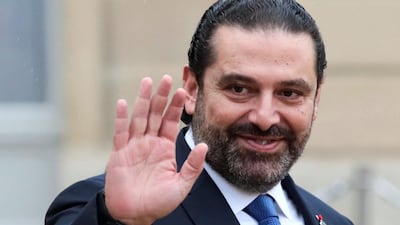Lebanese Prime Minister-designate Saad Hariri is redoubling efforts to resolve an eight-month stalemate by launching talks to form a unity government.
Mr Hariri yesterday met Foreign Minister Gebran Bassil, a day after a long meeting with President Michel Aoun, to discuss a way forward.
Lebanon has been without a government since an election almost eight months ago, as its rival parties jostled over the allocation of Cabinet positions, further unsettling the country’s fragile economy.
“We have resumed work on the issue of the government,” Mr Bassil told reporters after meeting the prime minister at his Beirut residence. “I have made some suggestions to the prime minister regarding the issue,” he said, explaining that they had both agreed to reach out to relevant parties to end the impasse.
__________________
Read more:
Lebanon: No sign of consensus as political deadlock enters eighth month
Moody's revises Lebanon's rating to negative on higher geopolitical risks
Lebanon on brink of economic ruin, finance minister warns
__________________
Mr Hariri and Mr Aoun are “determined to form a government”, state news agency NNA reported the prime minister saying after the two met on Tuesday.
“We have fallen behind. We must form the government,” Mr Hariri said at the presidential palace. “The president and I are determined to meet again and finish this issue because the country cannot continue without a government.”
Yesterday, militant group Hezbollah also said it believed a government will be formed soon. The vice president of the organisation’s political council said the will to end the deadlock is there.
Mahmoud Qomati also said that a government needs to be formed to improve deteriorating living conditions in the country.
A breakthrough to create a national unity government in line with Lebanon’s sectarian power-sharing system seemed close last month, but did not materialise and the impasse continued.
But Mr Hariri said on Sunday he still believed a government would be formed early in the new year.
Lebanon has the world’s third-highest level of debt to GDP and Finance Minister Ali Hassan Khalil said on Sunday it faces an economic crisis that could turn into a financial one.
Mr Hariri has pledged to carry out reforms that could unlock billions of dollars of international investment.
The International Monetary Fund has stressed the importance of Lebanon managing its debt, while bond yields and the cost of insuring against Lebanese sovereign debt showed signs of stress in recent months.
The inflation rate increased from 1.5 per cent in 2017 to 7 per cent last year, leaving Lebanese consumers with a shortage of money and less buying power.
Economic growth slowed from 8 per cent in 2010 to 0.6 per cent in 2017, according to the country’s statistics agency.
The IMF projects a GDP growth of just 1 per cent for 2018.
The political and economic crisis has aggravated public discontent. Hundreds of demonstrators took to the streets of Beirut last month, where they called for the government to fall for what they described as poor management.

